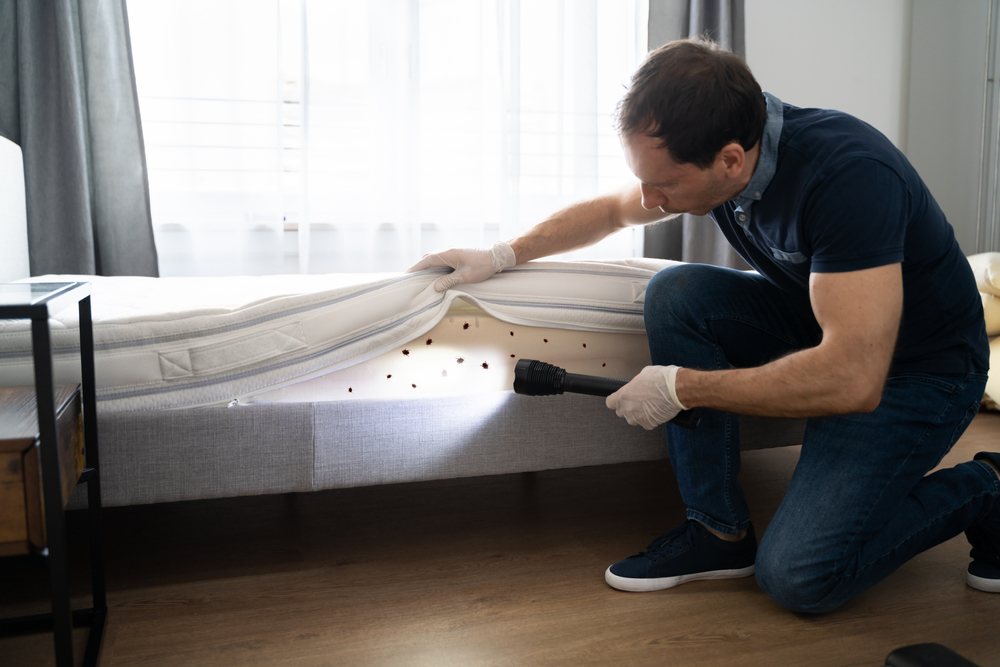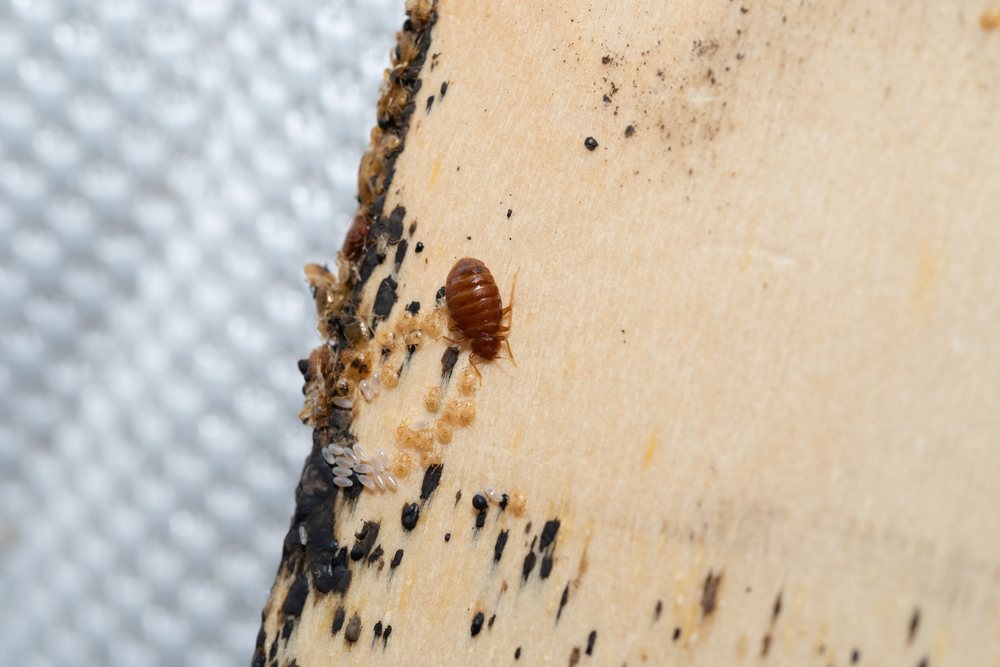As autumn begins to fade into winter, many animals begin the process of hibernation in order to preserve energy during the colder months.
They will enter a prolonged period of sleep as their bodies slow down metabolic processes like breathing and heart rate. Many species won’t awaken until the spring.
This is also true of insects, including bed bugs. If bed bugs are exposed to colder temperatures, they will enter a period of dormancy called diapause.

Diapause is the insect equivalent of hibernation.
With the only major difference being…
That diapause completely suspends the growth of an insect instead of merely keeping them in a state of slumber.
But not even the coldest weather will deter bed bugs for long…
Page Contents:
So, Do Bed Bugs Like The Cold?
Bed bugs do not like cold temperatures, which is why they stay indoors where the climate is temperate and more controlled. This doesn’t mean the cold will kill bed bugs, as these creatures have adapted to survive most environments.
Colder temperatures do cause bed bugs to move slower. They also cannot feed or breed as easily in an environment lower than 50 degrees.
As bed bugs are able to go into a state of hibernation when it gets too cold, it allows them to survive almost a full year without feeding in some cases.
Can Bed Bugs Survive in the Cold?
Yes, bed bugs can survive in colder temperatures. It would take several days of exposure at below freezing temperatures to kill bed bugs. Though these pests don’t have to worry about this usually because they’re inherently an indoor pest. Everything they need, from food to shelter, can be found in the relative comfort of a home.
In the winter, this includes heat.
In an effort to keep the cold out, most people keep their heat on during winter. A 2018 study conducted by the US Energy Information Administration revealed that 99% of all Americans use some form of central heating in the winter months.
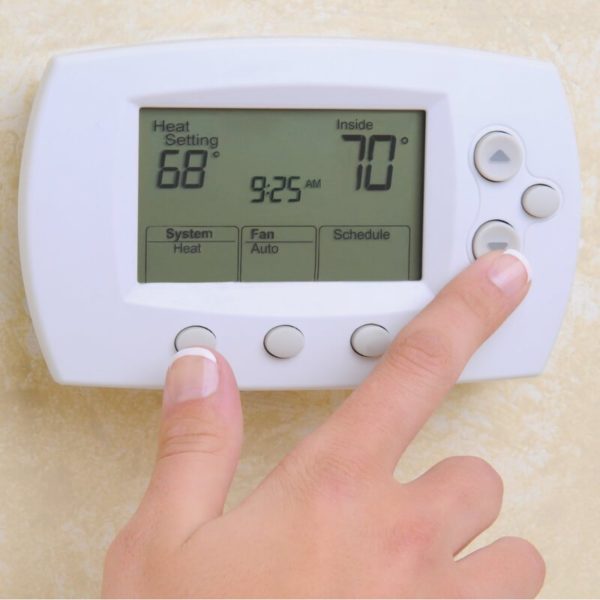
This has the unintended side effect of encouraging any possible bed bug infestations to remain active. As long as the temperature remains warm enough, bed bugs will continue to feed, breed and be a general nuisance.
Even if you don’t keep your heat on all winter, it still won’t be enough to drive bed bugs out.
They will simply return to any hiding places they have established and enter diapause until the temperature rises again.
This is why freezing bed bugs is a debunked method for effectively getting rid of an infestation.
That’s not to say it isn’t possible to kill a bed bug by freezing it…
But it’s highly inefficient and is not recommended as a means of eradicating, or even mitigating a full on infestation.
At What Temperature Do Bed Bugs Die?
Bed bugs are incredibly resilient. Any attempt to kill them by turning off the heat won’t work, because they will enter diapause and tough it out. Only extreme temperatures will be enough to eradicate bed bugs.
Bed bugs will only die from exposure to the cold if the temperature is 0 degrees Fahrenheit. Though even that temperature is still not enough to kill them quickly.

The temperature must remain consistently at or below freezing for a period of 4 days or more.
Then, and only then, will bed bugs be killed.
Do Bed Bugs Prefer Hot Or Cold?
As mentioned earlier, bed bugs are primarily indoor pests. In order to survive the harshness of winter, they need access to 3 things: food, shelter, and heat.
When a bed bug undergoes diapause, their growth cycle is completely suspended. On average, a bed bug fully matures after 7 weeks of growth.
But if a bed bug entered diapause as a larva, for example, then they would remain in the larval stage until they exit this hibernative state. This means that the bed bug would stay a larva even if diapause lasts longer than the normal larval period.
The preference of heat also explains why bed bug infestations are more common in the spring and summer than in the winter.
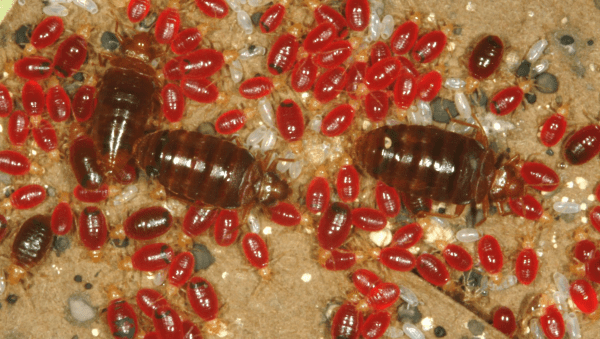
Temperatures are consistently high enough that they have no need to hibernate.
So bed bugs can begin feeding and reproducing without incident.
Just as extreme cold can kill bed bugs, so can extreme heat. The average heat at which all bed bugs can be killed, including adults and eggs, is 125 degrees F. Steam cleaning is a great method of eradicating bed bugs with extreme heat, as the steam can reach temperatures of 160 degrees F.
For bed bug control experts, heat is actually the most common treatment method used.
Heat treatments for full scale infestations require the help of professionals, because it uses big industrial heaters to bring a home or apartment to temperatures above 130 degrees for several hours.

Though this treatment can be expensive (up to $5,000 per home) it has the following benefits:
- Requires only 1 treatment to remove a full scale infestation.
- Doesn’t use harsh chemicals that can harm your health.
- Environmentally friendly.
- Residents can return home shortly after the treatment is finished.
How Do Bed Bugs Die Naturally?
The natural lifespan of a bed bug isn’t very long. If allowed to live in comfortable conditions and remain undisturbed, a bed bug will die of natural causes after 6 to 12 months.
While they can die of starvation, the resilience of a bed bug allows it to go for prolonged periods without food.
Depending on the temperature, and assuming an above-average lifespan, bed bugs can survive for as long as 400 days between feeding periods.
This is especially prolonged when the bed bug is exposed to cold and enters a dormant state.
Do Bed Bugs Die In Water?
Bed bugs can, in fact, be killed with water. Their bodies are not built for swimming, meaning it should be easy to simply drown them if necessary.
Emphasis on should.
The survivability of a bed bug is not to be underestimated. Their flat bodies enable them to float on the water’s surface for a long time, and since they absorb oxygen through pores in their skin rather than lungs, they can continue to breathe as long as there is enough oxygen in the water.
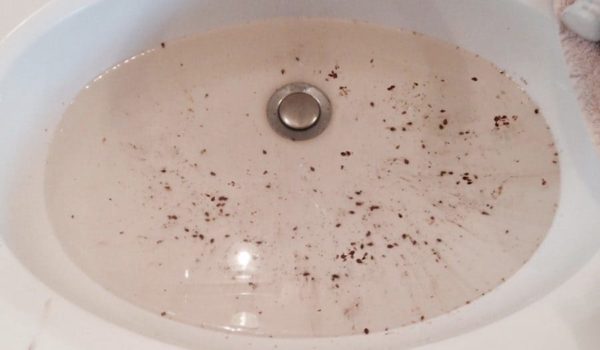
And this is assuming you are willing to waste time and energy trying to pluck every individual bed bug out of its hiding place and put them in water to drown.
Therefore it takes roughly 24 hours for a bed bug to die from drowning.
Boiling water at a temperature of 140 degrees Fahrenheit is sufficient enough to kill bed bugs. Again, extreme temperatures are deadly to these pests.
Interesting Fact: Bed bugs are one of the few species in the world that can survive without drinking water.
So, Do Bed Bugs Disappear In The Winter?
Not entirely. While new infestations are less likely to occur, they won’t stop completely. Bed bug colonies which have already established a nest won’t suddenly go dormant, either.
Most insects and arachnids, like mosquitoes and spiders, are affected more by the cold due to living almost exclusively outdoors. Since bed bugs prefer an indoor environment regardless of the season…
Winter temperatures won’t affect them as much.
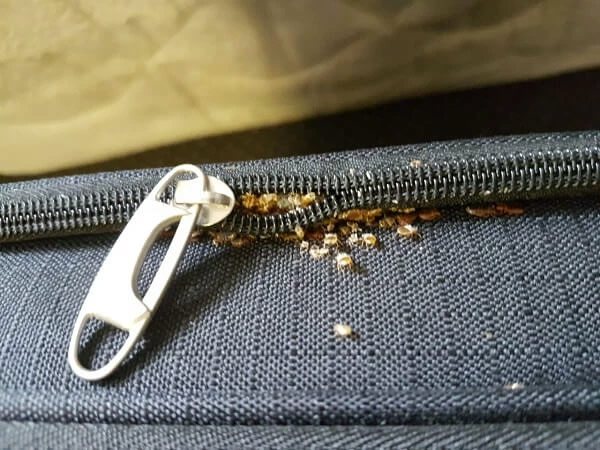
And as millions of people travel abroad for the holidays, there is a likelihood of bed bugs traveling as well.
People who travel will likely stay either at a relative’s house or at a hotel. If the building is infested with bed bugs and the insects manage to hide in your personal belongings, then you could unintentionally bring the infestation home with you.
So even though bed bugs are somewhat seasonal insects, bed bug lawsuits tend to pop up when there are spikes in traveling during the winter holidays.
How You Know When Bed Bugs Are Gone
Even if a bed bug infestation is professionally treated, it can be difficult to tell when these creatures are completely gone. This can cause fear and anxiety that the bugs weren’t all wiped out, that a few managed to hide away somewhere and are repopulating.
Fortunately, there are methods of telling when the infestation has ended.
The 6-8 Week Method
The “6-8 Week Method” is a grace period which can be used to determine whether or not an infestation has been completely exterminated. It relies on the fact that bed bugs take at least 6 weeks to fully mature.
If this period ends with no new bites or other signs of bed bugs inhabiting the area, then the infestation has been successfully removed from your home or establishment.
Bed Bug Monitors
Bed bug monitors and traps can be used to gauge the progress of a treatment and catch any bed bugs still lingering around. Several monitors release carbon dioxide and heat, which lures the bugs in and makes capturing them easier.
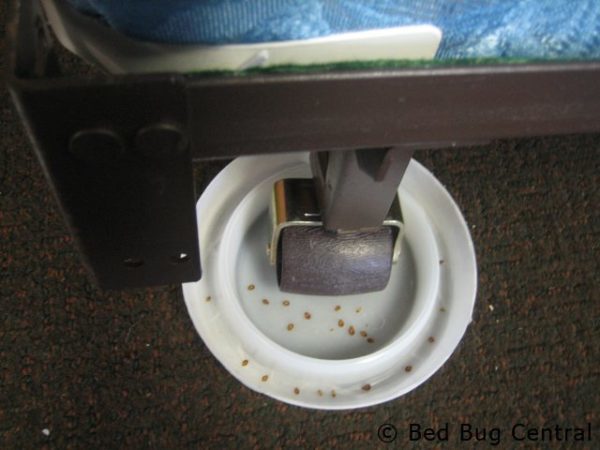
If the traps don’t catch any bed bugs after a short period of time, this is another indicator that you are no longer dealing with these pests.
Click here for more information on the types of traps and monitors available for purchase.
Are You Dealing With Bed Bugs? Contact Us
Nobody likes to admit they are suffering from an infestation. It can be difficult to reach out for help, and it can also be costly.
That’s why we are here to help.
If you suffered damages from bed bugs in a hotel, apartment or other residence, please give us a call at (855) 733-9217.
We will put you in contact with a lawyer who will guide you through the legal steps necessary to earn any financial compensation you may be eligible for.
The consultation is 100% free and we are available 24 hours a day, 7 days a week.
Call today!
Written by James Oliver
